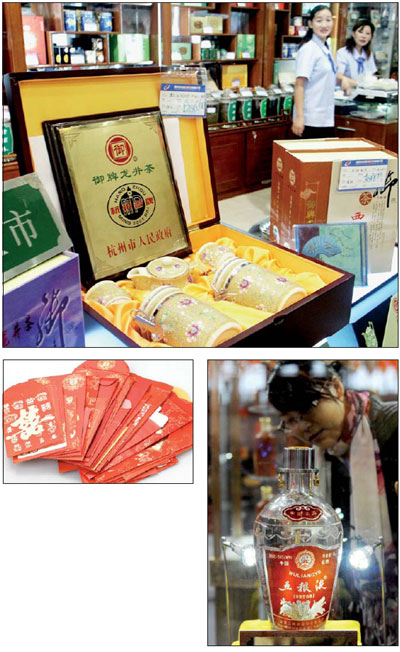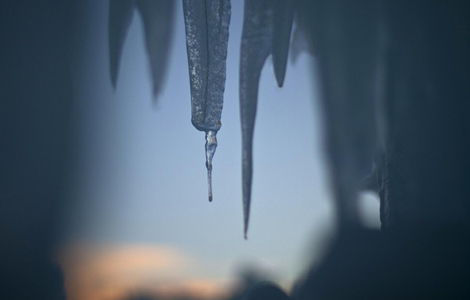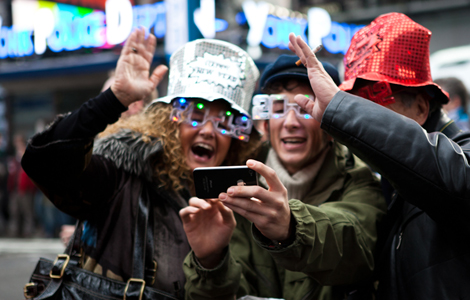New Year Gift Guide
Updated: 2011-12-30 07:42
By Ginger Huang (黄原竟) (China Daily)
|
||||||||
|
Clockwise from top: Longjing (龙井), Wuliangye (五粮液) and hongbao (红包) are all considered very welcome items on the New Year gift list of Chinese people. [Photos provided to China Daily] |
As the spring festival approaches let's discover what are the presents being most talked about
新年将至,礼物多多。在中国 ,送礼的讲究可不少。
Everyone knows that the Mid-Autumn Festival is the time for moon cake gifts, and the Dragon Boat Festival calls for bellyfuls of zongzi (粽子 zòngzi), but for the New Year's Day, there is no set rule for gift giving. To choose the right things to give your friends, bosses, children's teachers and mother-in-law... as gifts to celebrate the coming of the new year, the World of Chinese has something to say.
The sure thing: The hongbao
The most traditional of all new year gifts, the hongbao (红包 hóngbāo) is also the simplest: an elaborately decorated red envelope filled with money. You'll find such kind of envelop in any supermarket, stationary store or flower shop in China or Chinatown. And as the new year approaches, there are sure to be more around.
Don't make any rookie mistakes! Use only one or two large bills, to keep the value of the envelope hidden. If you're stuffing it with hundreds, go for even numbers for good luck: 200, 600 or 800. Don't hand out bad luck with a gift of 400, or anything with the number four, the unluckiest of all numbers. Instead, stick to ones, fives, and, best of all, eights. Those are "beloved numbers".
Be careful when passing your hongbao to a teacher or anyone in an official position. The traditional red envelopes have often been used as a vehicle for bribes. But for children, they are perfect!
Moutai or Wuliangye
Baijiu (白酒 báijiǔ), the ferocious grain liquor, ranges from 38 percent all the way up to 56 percent alcohol. It may be difficult for foreigners to stomach, but for the Chinese, it's really the gift that keeps on giving.
An 8 yuan ($1, 0.96 euros) bottle of erguotou (二锅头 èrguōtóu) from the corner store, though, won't cut it - you've got to go classy, or don't go at all. To really impress a Chinese colleague, show up with a genuine bottle of the legendarily hard-to-find Moutai (茅台 máotái), which retails from a minimum of 80 yuan a bottle, to a maximum of the sky.
But it is so highly sought, rumor claims that you can't buy a genuine bottle outside of Guizhou province, so only buy this from credible liquor stores.
If you are unable to track Moutai down, go for a bottle of Wuliangye (五粮液 wǔliángyè). It is tasty, respected and ranges in price from 270 yuan to nearly 4,000 yuan. Needless to say, it is a gift you know will be appreciated.
A tin of tea
This may sound like an odd gift, but in a country where a pot of cha (茶 chá, tea) can cost a thousand yuan or more, this is a tin that won't be turned down.
Obviously, a box of Lipton from a supermarket isn't going to make the grade. Instead, splurge on a fancy box of green tea. Some of our favorites include Xihu Longjing (西湖龙井 xīhú lóngjǐng), Dongting Biluochun (洞庭碧螺春 tòngtíng bìluóchūn), and Huangshan Maofeng (黄山毛峰 huángshān máofēng), but there are hundreds of specialties worth exploring. Find a respected teashop, and consult the salespeople.
A box of smokes
Gifting a carton of cigarettes in the United States may conjure up memories of Bender and The Breakfast Club ("Smoke up, Johnny!"), but here in China, it will win hearts and handshakes quicker than you can offer a light.
Chunghwa (中华烟 zhōnghuáyān), "the national cigarette", is also the most expensive on the market, so you know it is good. The slightly more affordable cartons of Panda (熊猫 xíongmāo), Yuxi (玉溪 yùxī), or Yunyan (云烟 yúnyān)also get the job done.
Local specialties
Liquor, tea and smokes are great gifts, but a more unique way to impress is with a truly local specialty: a xiangli pear (香梨 xiānglí) from Xinjiang, a Yantai apple (烟台苹果 yāntāi píngguǒ) or Pingyao beef jerky (平遥牛肉干 píngyáo niúròugān).
Each province has its own representative office (办事处) in big cities, usually named after the area and followed by a 大厦 (dàshà, building). Along with a collection of provincial offices, there is usually a specialty store, selling incredible local goods and gifts. Not all the offices have these stores, but they will definitely tell you where to find one nearby.
If you do go this route for the gifts, be sure to go at lunchtime, so you can sample the local foods yourself: Most representative offices house a fantastic restaurant as well.
Courtesy of The World of Chinese, www.theworldofchinese.com












